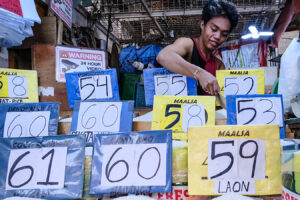By Kenneth Christiane L. Basilio
THE HOUSE of Representatives on Tuesday approved on second reading a bill that seeks to allow the National Food Authority (NFA) to sell rice at subsidized prices during emergencies including shortages.
Philippine congressmen through a voice vote agreed to expand the agency’s regulatory functions over the rice industry through House Bill No. 10381 amid spiraling prices of the staple.
The bill seeks to amend the Rice Tariffication Law (RTL), which gave private traders full control over rice imports in 2019.
The measure also extends the validity period for the Rice Competitiveness Enhancement Fund (RCEF) for six more years and increases its budget to P15 billion from P10 billion, congressmen said during plenary debates.
“The House’s expeditious action on the Rice Tariffication Law amendments comes from… the current rice price crisis,” Albay Rep. Jose Maria Clemente S. Salceda told BusinessWorld in a Viber message. “It has exposed the shortcomings of the global rice trade and why domestic support remains crucial.”
The House of Representatives is expediting its deliberations on the rice law to address the expensive costs of rice in markets by allowing the NFA to restore its price stabilization and supply regulation functions.
Retail prices of staple grain range between P50 and P65 per kilo, according to latest Philippine Statistics Authority data.
House Speaker Ferdinand Martin G. Romualdez said amending the Rice Tariffication Law would reduce rice prices to less than P30 a kilo.
“By amending the RTL, we aim to bring about tangible reductions in rice prices,” Mr. Romualdez said in a statement. “Lowering rice prices to less than P30 is a crucial step towards ensuring food security and economic stability.”
Under the bill, the NFA would be allowed to intervene in the market under the direction of the National Price Coordinating Council — comprised of state economic managers — during food security emergencies caused by rice shortages and sustained increases in the price of the staple grain.
“An empowered NFA really would have a role to play in ensuring food and especially rice security,” IBON Foundation Executive Director Jose Enrique A. Africa told BusinessWorld in a Viber message before the bill’s approval.
He said addressing rice inflation requires the government to look beyond reinstating NFA’s regulatory functions.
In April, rice inflation surged by 23.9%, but easing from the 24.4% a month prior as world rice prices declined.
Mr. Africa said the Philippines should reduce its dependence on imported rice given the peso’s weakness.
“The import content of palay is over 30%, and a large part of rice inflation is through this channel,” Mr. Africa said. “Reducing the import content of food and the vulnerability of food prices to foreign exchange movements goes far beyond the NFA.”
Developing the industrial capability of the agriculture sector is needed to strengthen the domestic production of rice, he added.
Amendments to the Rice Tariffication Law would also modify how RCEF is allocated. Around 53.5% of the fund would go to farm mechanization projects, up from the current 50%. This increase would help in modernizing the country’s rice sector, according to proponents of the measure.
The allocation for the propagation and distribution of rice seeds under the bill was reduced to 29.7% from the current 30%, while rice seed allocation was trimmed to 29.7% from 30% currently.
Farm credit assistance for farmers has been cut to 6% from 10% while extension services for agricultural training was reduced to 3.3% from 10% of the rice fund.
During the bill’s period of amendments, Albay Rep. Edcel C. Lagman, Sr. moved for the deletion of a provision allowing the NFA to regulate foreign investment in the rice and corn industry, which the House adopted.
“This deletion will also send the message that as much as practicable, the rice and corn industry must remain with Filipino farmers and entrepreneurs to protect the production and sale of the Philippines’ staple grain and cereal from foreign influence,” Mr. Lagman said.
Action for Economic Reforms Coordinator Filomeno S. Sta Ana, III. agreed with Mr. Lagman’s amendment to the bill, saying that is not part of the NFA’s role.
